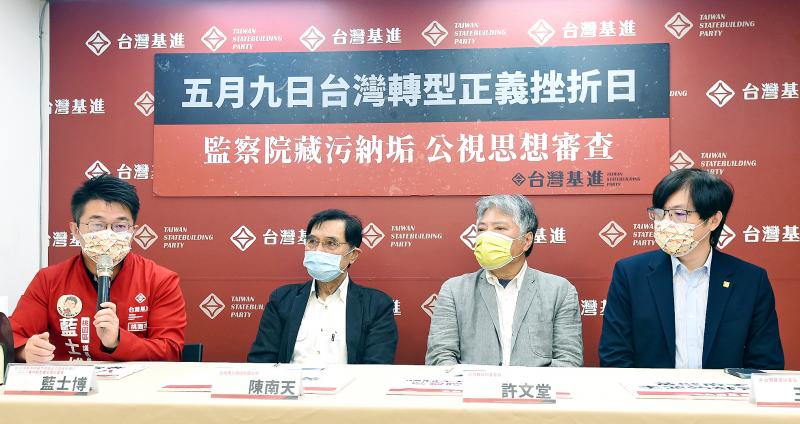The Taiwan Statebuilding Party together with pro-Taiwan independence groups slammed recent government moves at a media briefing yesterday, while also opposing the president’s nomination of People First Party (PFP) Secretary-General Lee Hung-chun (李鴻鈞) as vice president of the Control Yuan.
At the event in Taipei, Taiwan Statebuilding Party Secretary-General Wang Sing-huan (王興煥) said he was disappointed that the government was moving backwards with regard to political reform and pandering to conservative forces by not allowing a Taiwanese historian to serve as a board member of the publicly funded Taiwan Broadcasting System (TBS).
Wang and the groups said they were marking May 9 as “A Day of Setback for Taiwan Transitional Justice,” referring to Monday, when the decisions were announced.

Photo: Liao Chen-huei, Taipei Times
“Looking at the core values and history of the KMT [Chinese Nationalist Party] and the PFP, the transitional justice process is working to clean up the stains and past wrongdoings, done by these two parties,” Wang said, explaining why they are offended that President Tsai Ing-wen (蔡英文) nominated Lee, who was previously also a KMT member.
World United Formosans for Independence (WUFI) chairman Chen Nan-tien (陳南天) said that the Control Yuan deputy president must rise above partisan politics and have a long-term vision.
He questioned Lee’s political stance and his roles during Taiwan’s democratization and transitional justice process.
Lee served four terms as legislator from 2002 to 2020, representing the PFP during his first two terms and the KMT during the latter two.
President Tsai could find numerous people from the Democratic Progressive Party or prominent figures in Taiwan to nominate instead, Chen said.
“This nomination has betrayed the wishes of the vast majority of the public, and seems like a personal appointment that is not based on a balance of political power,” Chen added.
Taiwan Statebuilding Party and WUFI officials condemned the decision by the TBS board member selection committee to reject the appointment of Chen Tsui-lien (陳翠蓮), a Taiwan National University professor of history.
Wang referred to the TBS committee’s explanation that Chen Tsui-lien was unsuitable “because she conducts research into the 228 Incident, resulting in strife between Taiwan’s various ethnic groups.”
The TBS governing board is in charge of the state-funded Taiwan Public Television Service, which together with its affiliated state television networks braodcasts in Hoklo (commonly known as Taiwanese), Hakka and other indigenous languages, showing the people with this decision that it does not have the public interest in mind and is hypocritical, he said.
“The rejection also rejects the current transitional process,” Wang said.

The Coast Guard Administration (CGA) yesterday said it had deployed patrol vessels to expel a China Coast Guard ship and a Chinese fishing boat near Pratas Island (Dongsha Island, 東沙群島) in the South China Sea. The China Coast Guard vessel was 28 nautical miles (52km) northeast of Pratas at 6:15am on Thursday, approaching the island’s restricted waters, which extend 24 nautical miles from its shoreline, the CGA’s Dongsha-Nansha Branch said in a statement. The Tainan, a 2,000-tonne cutter, was deployed by the CGA to shadow the Chinese ship, which left the area at 2:39pm on Friday, the statement said. At 6:31pm on Friday,

The Chinese People’s Liberation Army Navy’s (PLAN) third aircraft carrier, the Fujian, would pose a steep challenge to Taiwan’s ability to defend itself against a full-scale invasion, a defense expert said yesterday. Institute of National Defense and Security Research analyst Chieh Chung (揭仲) made the comment hours after the PLAN confirmed the carrier recently passed through the Taiwan Strait to conduct “scientific research tests and training missions” in the South China Sea. China has two carriers in operation — the Liaoning and the Shandong — with the Fujian undergoing sea trials. Although the PLAN needs time to train the Fujian’s air wing and

The American Institute in Taiwan (AIT) put Taiwan in danger, Ma Ying-jeou Foundation director Hsiao Hsu-tsen (蕭旭岑) said yesterday, hours after the de facto US embassy said that Beijing had misinterpreted World War II-era documents to isolate Taiwan. The AIT’s comments harmed the Republic of China’s (ROC) national interests and contradicted a part of the “six assurances” stipulating that the US would not change its official position on Taiwan’s sovereignty, Hsiao said. The “six assurances,” which were given by then-US president Ronald Reagan to Taiwan in 1982, say that Washington would not set a date for ending arm sales to Taiwan, consult

A Taiwanese academic yesterday said that Chinese Ambassador to Denmark Wang Xuefeng (王雪峰) disrespected Denmark and Japan when he earlier this year allegedly asked Japan’s embassy to make Taiwan’s representatives leave an event in Copenhagen. The Danish-language Berlingske on Sunday reported the incident in an article with the headline “The emperor’s birthday ended in drama in Copenhagen: More conflict may be on the way between Denmark and China.” It said that on Feb. 26, the Japanese embassy in Denmark held an event for Japanese Emperor Naruhito’s birthday, with about 200 guests in attendance, including representatives from Taiwan. After addressing the Japanese hosts, Wang